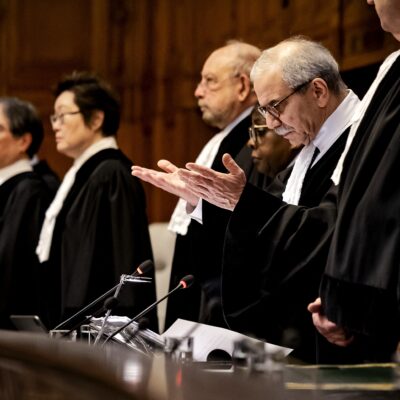Lawmakers pressed Qatari leaders on Al Jazeera coverage, Red Cross access to hostages
The delegation pushed for Doha to expel Hamas leaders after all hostages are released

EuropaNewswire/Gado/Getty Images
Sheikh Mohammed bin Abdulrahman bin Jassim Al-Thani, Minister for Foreign Affairs of the State of Qatar, during a high-level exhibition on Harnessing the Power of Sport in Achieving Sustainable Development at the UN Headquarters in New York City on September 22, 2017.
U.S. lawmakers who visited Qatar earlier this month raised concerns about the coverage of the Israel-Hamas war being propagated by state-owned media outlet Al Jazeera, and urged the Gulf nation to help ensure Red Cross access to the hostages being held in the Gaza Strip, in addition to pressing Qatar’s prime minister to place more pressure on Hamas to free hostages.
A bipartisan and bicameral group of lawmakers visited Qatar, Egypt, Bahrain and Israel in early January on a trip focused largely on the hostages still being held in Gaza. During their time in Qatar, lawmakers recounted that they offered strong warnings to Qatari Prime Minister Mohammed bin Abdulrahman bin Jassim Al Thani of the need to increase pressure on Hamas or face consequences in the country’s relationship with the U.S.
Rep. Donald Norcross (D-NJ) told Jewish Insider that the group’s time in Doha included discussion of Al Jazeera’s “toxic” coverage — which many in the U.S. link directly to the Qatari government — as well as the Red Cross’ largely ineffectual role in ensuring the hostages’ safety.
Norcross said that Al Jazeera’s coverage, which he described as rife with “disinformation and lies” and counterproductive to the pursuit of peace, was a particular point of contention in the meeting.
”We had very different views on what we believe was being delivered,” he said. Qatari leaders claimed that the news outlet is editorially independent and enjoys freedom of the press. The New Jersey congressman suggested there was “irony” in that explanation, “and that’s why we were very forceful in this.”
He said the Qatari leaders seemed to agree, however, with the lawmakers that the Red Cross should be allowed to visit the Israeli hostages.
Norcross described the conversation with Al Thani as being “as frank and as direct” a conversation as he’s ever had with a head of state. He said lawmakers conveyed that Qatar must either increase pressure on Hamas and ensure it releases the hostages or expel its leadership from the country.
“If you’re not negotiating, then you’re harboring terrorists,” Norcross said. “And when those words were spoken at that meeting, you could visibly see the reaction [from] the prime minister. And he was clear in suggesting that [they] are not harboring, that [they] were asked, quite frankly, to be in this role.”
Rep. Jimmy Panetta (D-CA) alluded to a similar message, saying that the lawmakers wanted to make it clear that they believe the Qataris “are playing a bit more than a neutral role when it comes to this, and that they have skin in the game based on their relationship with Hamas leadership, based on their hosting the Hamas leadership.”
He said he’d suggested to Qatari leaders that their conduct in these negotiations would have consequences for Qatar’s reputation in the U.S. and around the world — which Qatari leaders have aggressively protected and sought to burnish in recent years.
“What I stressed to the prime minister was that this is a critical moment,” he said. “We’re sort of at an inflection point where we have the opportunity to either reshape the region or reinforce its problems… They can play a big part of [the future of the region] based on the choices that they make now, with the leadership of Hamas that they have in their country.”
Panetta said that the lawmakers also “made it clear” that once the hostages are released, Hamas leaders need to be expelled from Qatar. He said the Qataris didn’t offer a specific commitment to do so, “but I think they understood our desires and they understood the pressure that we displayed in the meeting.”
Coming out of the trip, Panetta said he has “confidence” that parties in the region “are trying very hard to find those levers” to push for the release of hostages and, in the longer term, secure peace in the region, which he said “should give people hope going forward” for both the hostages and an ultimate peaceful settlement.
Looking toward the long term, he added, Qatar, Egypt and other actors in the region “understand they have a part to play” in supporting Gaza’s recovery economically and potentially in providing security. But Norcross noted that Qatar is concerned about helping to finance reconstruction in Gaza without a lasting peace, worrying about future rounds of war.
Both lawmakers said that conversations with released hostages, family members of hostages and other victims of the Oct. 7 massacre — including a tour of Kibbutz Nir Oz conducted by one of its former residents — were particularly impactful.
Norcross said that a conversation with a hostage, whose husband is still in Hamas custody, “rips your heart out.”
Both recounted seeing the still-damaged homes of kibbutz residents, where they were able to see firsthand the shrapnel from the attacks.
Panetta relayed the story of a father who used his body to hold shut the door to a room with his two sons for hours.
“You hear about the violence, you hear about the attack. You hear about the death and destruction, the savagery that took place,” he said. “But amongst all that, there were acts of heroism by civilians, who were protecting not only themselves but protecting their family members. And to me, that was just very heartening to hear… that resonated with me and is something I’ll never forget.”










